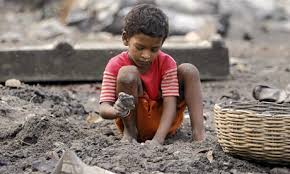 It is very disturbing that child labour is still an unsolved problem in the 21st century. On one hand we talk about achievements such as making a mark in space by successfully launching Mangalyaan to explore Mars, while on the other India is the largest hub of child labourers. Do we really deserve to feel pride on account of these contrasting factors?
It is very disturbing that child labour is still an unsolved problem in the 21st century. On one hand we talk about achievements such as making a mark in space by successfully launching Mangalyaan to explore Mars, while on the other India is the largest hub of child labourers. Do we really deserve to feel pride on account of these contrasting factors?
Unfortunately, even today a child has to beat hammer on iron, sell tea on railway platforms and trains, wash utensils in hotels and work in garages to satisfy their hunger or their family. It pinches me when I see these child labourers watching, with a surprised look, nicely dressed school- going children or students partying at the canteen or hotel, and then turn away to get engaged in their work with pale faces. A child working at tea stall may have to stand for hours and hours to serve the customers. Children also are forced to work in unhealthy environments like in bidi and fireworks factories resulting in a great toll to their health.
On one side, the government argues that children employed below the age of fourteen years is illegal and should be sent to school, given free primary education. But there is no such quality education being imparted in these government-run primary schools. The condition of some government schools in Bihar is so pathetic that they do not even have a proper ceiling. In the marriage season almost every village primary school school turns into a marriage hall for whole month. I have observed that in some of these schools more hours are spent around cooking and distributing the mid-day meal than in teaching. Is this really helping in helping the poor to develop into skilled human resources in our country?
To be on the safe side, there is no harm if a child learns some sort of skill from their parents after school and so he can earn when he is mentally and physically prepared. The NGOs can’t feed each and every child, neither can the government. Therefore children learning inherited skills from their family should be encouraged along with education to be productive in the future.
Since on the grassroot level, the basic infrastructure is not so strong to counter this major issue then question arises – can government really enforce laws against child labour, if these pathetic situations prevail within in the system?
[Written by Ravi Ranjan Kumar, Newsnet One intern]

